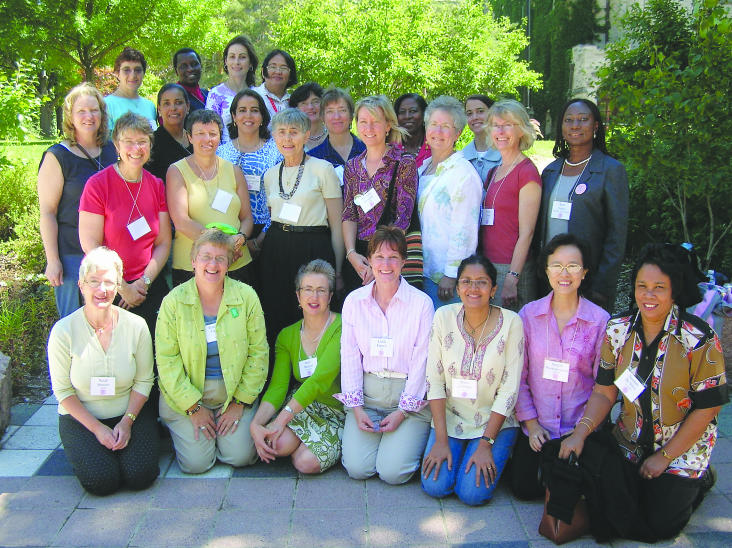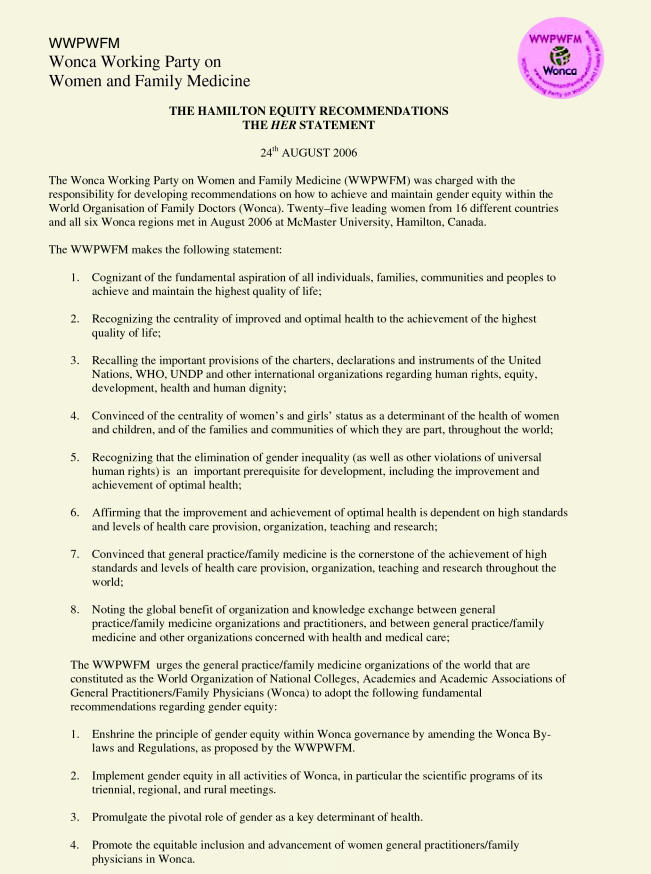Wonca Working Party on Women and Family medicine in Hamilton, Ont, August 2006.
(fourth row) Susana Alvear, Ecuador; Anne D. Atai-Omoruto, Republic of Uganda; Flor Ledesma, Venezuela; Zorayda Leopando, Philippines; (third row) Jan Coles, Australia; Dorothy Pietersz-Janga, Netherlands Antilles; Liliana Arias-Castillo, Colombia; Ilse Hellemann, Austria; Sue Smith, Nepal; Marlene Joseph, Antigua and Barbuda; Kymm Feldman, Canada; (second row) Cheryl Levitt, Canada; Lucy Candib, United States; May Cohen, Canada; Michelle Howard, Canada; Barbara Lent, Canada; Sheila Dunn, Canada; Kate Anteyi, Nigeria; (first row) Sarah Strasser, Canada; Betsy Garrett, United States; Ruth Stewart, Australia; Linda French, United States; Marie Andrades, Pakistan; Somjit Prueksaritanond, Thailand; Nandani de Silva, Sri Lanka
Last summer, McMaster University in Hamilton, Ont, was the site of a unique and productive meeting of the Wonca Working Party on Women and Family Medicine (WWPWFM). The 25 participants, representing 16 different countries (Antigua and Barbuda, Australia, Austria, Canada, Colombia, Ecuador, Nepal, Nigeria, Netherlands Antilles, Pakistan, Philippines, Sri Lanka, Thailand, Uganda, United States of America, and Venezuela), and all 6 Wonca regions came together to further their discussions and activities on gender issues affecting both physicians and patients.
Canadian involvement
Several Canadian family physicians contributed substantially to the success of the meeting. Dr Cheryl Levitt, former chair of McMaster’s Department of Family Medicine and Past President of the Ontario College of Family Physicians, chaired the meeting, which Ms Michelle Howard, also from McMaster, and Dr Barbara Lent, from The University of Western Ontario, helped to plan. In addition, Dr May Cohen, Professor Emeritus from McMaster University, Drs Sheila Dunn and Kymm Feldman from the University of Toronto, and Dr Sarah Strasser from the Northern Ontario School of Medicine participated extensively.
Accomplishments
The group accomplished several tasks fundamental to its strategic plan developed at the last Wonca Triennial meeting, held in Orlando, Fla, in 2004. These included the following:
finalized recommendations for amendments to Wonca’s bylaws and regulations to reflect a strong perspective on gender equity, following several months of intense deliberation and legal consultation. These amendments were subsequently proposed to the core Executive Council in Buenos Aires, Argentina, in October;
developed a proposal for a “Women’s Track” for the Wonca meeting in Singapore next July, with plans to offer a smorgasbord of activities including a WWPWFM pre-conference, symposia, and leadership workshops;
made substantial progress in developing a statement urging Wonca to promote awareness of the vital effects of gender as a determinant of health; and
put together a policy statement on gender equity for Wonca’s endorsement. The Hamilton Equity Recommendations (The HER Statement) has been widely circulated by the meeting’s participants to their home organizations and has already been endorsed by the Board of Directors for both the Ontario College of Family Physicians and the College of Family Physicians of Canada. The Wonca Executive will be considering the statement at a future meeting.
Members of the WWPWFM look forward to working with family physician colleagues in future efforts to integrate gender equity into clinical practice, medical education, research development, and organizational activities.
Resources
The WWPWFM website (www.womenandfamilymedicine.com) contains information about the group’s past activities and future plans, and copies of the group’s numerous documents. You can subscribe to the WWPWFM’s listserve by sending a message to its coordinator, Dr Lucy Candib ( lcandib@massmed.org).
Gender issues in family practice
In 2004–2005, 60% of family physicians completing residency training were female (CAPER Quick Facts 2004–05, Canadian Post MD Education Registry).
In 2004–2005, 58% of first-year medical students were female (Canadian Medical Education Statistics, 2004, Association of Faculties of Medicine of Canada).
Women FPs on average work 44 h/wk and men 52 h/wk. These figures exclude on-call duty.
Male FPs work more total weekly hours and more direct patient care hours than female FPs.
If we look at total hours worked weekly by male and female FPs and whether they had children younger than 6, older than 6, or no dependents at all, we see that men who have dependents do in fact work longer hours than women who have dependents, but when no dependents are present, male and female FPs work pretty nearly the same total hours weekly (from National Physician Survey, 2004).
A greater proportion of women family doctors than men family doctors provide care in the 10 components of comprehensive care.
More men family doctors than women family doctors perform non-gynecologic procedures (from National Physician Survey, 2004).
Footnotes
Gender is used throughout the article to mean a social construct concerning roles, expectations, and values in contrast to biological differences related to sex.




